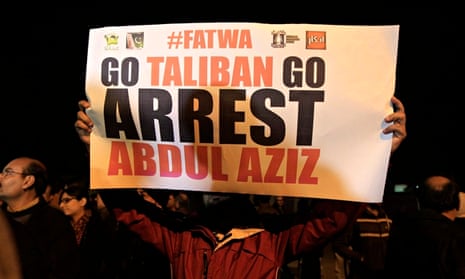The leader of protesters demanding the arrest of an infamous Pakistani cleric who refused to condemn last week’s massacre of more than 130 schoolboys has vowed to continue his fight despite being threatened by a Taliban commander.
Jibran Nasir, a former parliamentary candidate, has spearheaded the protests against Abdul Aziz, the extremist leader of the Red Mosque in Islamabad. On Monday he released a recording of a phone call from Ehsanullah Ehsan, spokesman of the Jamaat-ul-Ahrar faction of the Pakistani Taliban.
The well-known militant warned that by “disturbing the clergymen of the Red Mosque … you are making yourself, your family and your friends insecure”.
Nisar told The Guardian: “We are not backing out and I am getting lots of calls of solidarity. There are many people in Pakistan who want to create a counter-extremist narrative – we are not a nation of Taliban sympathisers.”
He and his supporters have also lodged demands for the police to open an investigation into the cleric after Aziz issued a thinly disguised threat of violence against the activists.
“People get provoked to a certain point until enough is enough,” said Shaan Taseer, another figure who has become prominent in the movement.“It is not just Peshawar, there is just this huge sense of injustice.”
Few people have a sharper appreciation of the dangers of publicly criticising religious extremists than Taseer, whose father Salmaan was gunned down in 2011 for daring to challenge Pakistan’s blasphemy laws.
The killing of Taseer, a prominent politician, terrified many Pakistanis into a traumatised silence on the issue of militancy.
Although small the demonstrations have articulated sentiments that since Taseer’s death have almost never been heard in public.
One man even brandished a placard demanding the release of Asia Bibi, the poor Christian woman sentenced to death for blasphemy who Taseer had attempted to help.Taseer said he was not protesting to avenge his father’s killing.
“We have a criminal case against Aziz for threatening our lives and we expect the state of Pakistan to pursue that,” he said.
The protests are tiny in comparison to those regularly organised by militant groups and commentators say they are no match for Pakistan’s vast network of radical mosques and widespread social acceptance of jihadi culture.
But the demonstrations, which have spread to other cities, can claim some initial successes in attracting support from secular political parties. Two separate ‘first investigation reports’ have been lodged against Aziz obliging police to investigate him.
The country’s interior minister has announced three police guards provided to Aziz in the past had been withdrawn.
Aziz has also attempted to retract his controversial remarks about the Peshawar attack – an apology the protesters have rejected.
